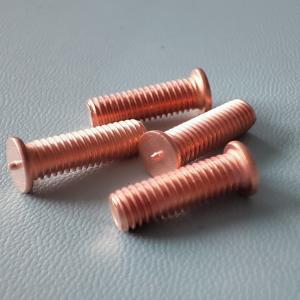M5x16 Arc Stud Welding Grade 4.8 Thread Bolts Mill Steel Copper Plated Studs
Add to Cart

Mill steel + copper plated ACR welding studs /welded studs
size M5X16
stud Welding is a general term for joining a metal stud, or similar part, to a work piece. Welding can be done by a number of welding processes including ARC, Resistance, Friction and Percussion. Of these processes, STUD ARC WELDING utilizes equipment and techniques unique to stud welding. The other processes use conventionally designed equipment with special tooling.
Mild steel, stainless steel and aluminum are applicable materials
for Arc Welding.
1: A fastener and ceramic ferrule are firmly placed against the
work surface under spring tension.
2: Upon triggering, the weld gun automatically lifts the fastener
from the base metal and initiates a controlled electric arc - which
melts the end of the fastener and a portion of the base metal.
3: A ceramic arc shield concentrates the heat and retains the
molten material in the weld area for maximum weld strength and
reliability.
4: At the precise moment the fastener and the parent metal become
molten, the fastener is automatically plunged into the work
surface. The metal solidifies and a high quality fusion weld is
completed.
HOW STUD WELDING WORKS.
Process. The process involves an arc being ignited, between the
face of the stud, and the surface of the work piece. Once both
parts are melted, the stud is smoothly pressed against the work
piece and joined together. Welding elements like threaded studs,
pins, tapped pads, etc. are welded by an arc without additional
material being required. As the stud is joined with the work piece
over the whole surface of the stud, the strength of the joint is
even higher than the base material or the stud.
Did you ever wonder why stud welding was invented?
Here are some of the reasons why the technology was created:
Drilling & Tapping
These processes are very slow. Thicker parent material is required,
as are longer studs.
Inserts
Can eventually work loose. They can also crack paint and leave
unsightly stains. Holes need to be punched and deburred in parent
material. The reverse side is not always clean and flat. The parent
material is weakened by the holes.
Back Welding
The process is slow. Holes need to be punched and deburred in
parent material. The excess weld needs grinding off, for a clean,
flat finish. The parent material is weakened by the holes.
Through Bolting
Requires two handed assembly and access from both sides. Holes need
to be punched and deburred in parent material. Bolt heads are
unsightly and stains can come from the bolt holes. The assembly is
not leak-proof and the parent material is weakened by the presence
of the holes.


